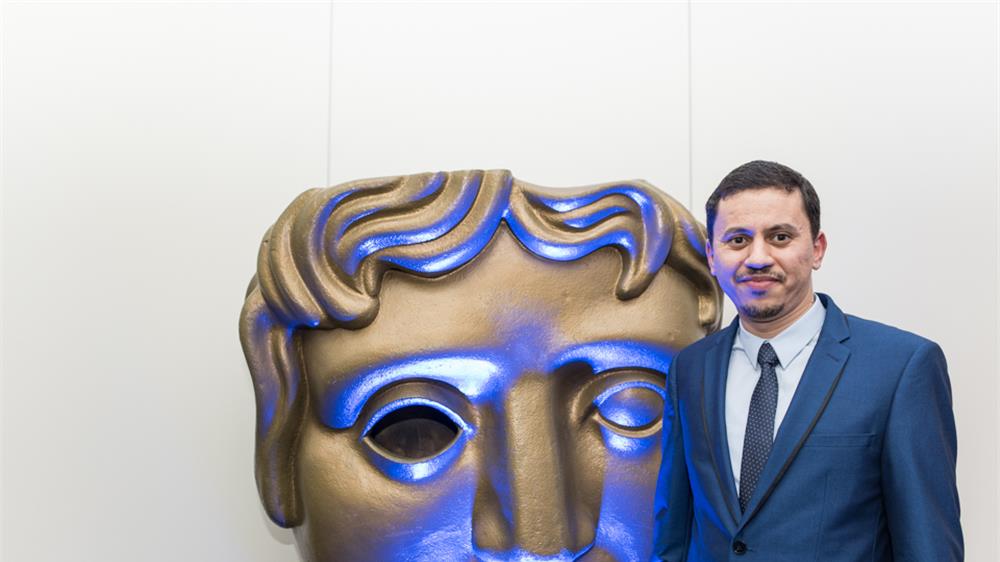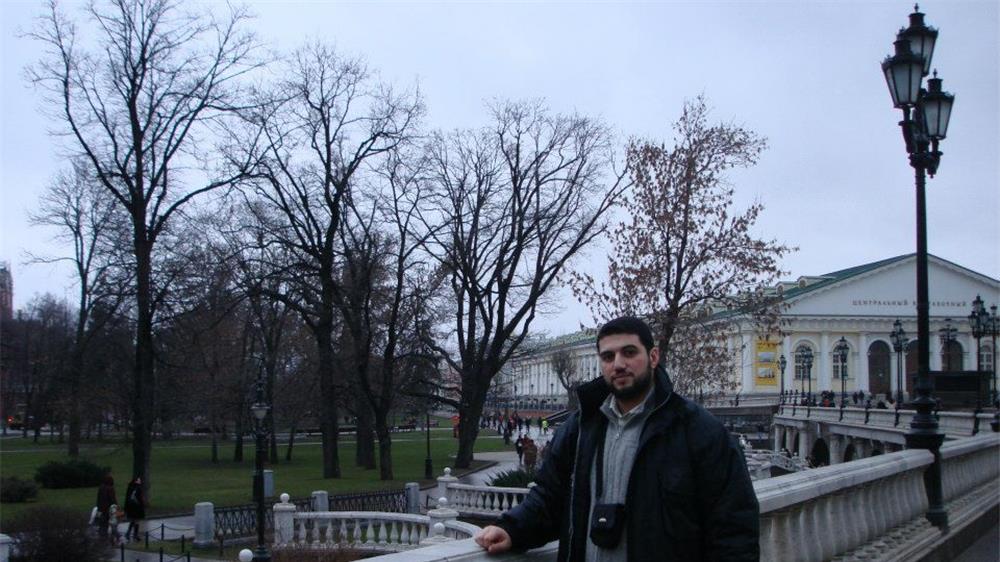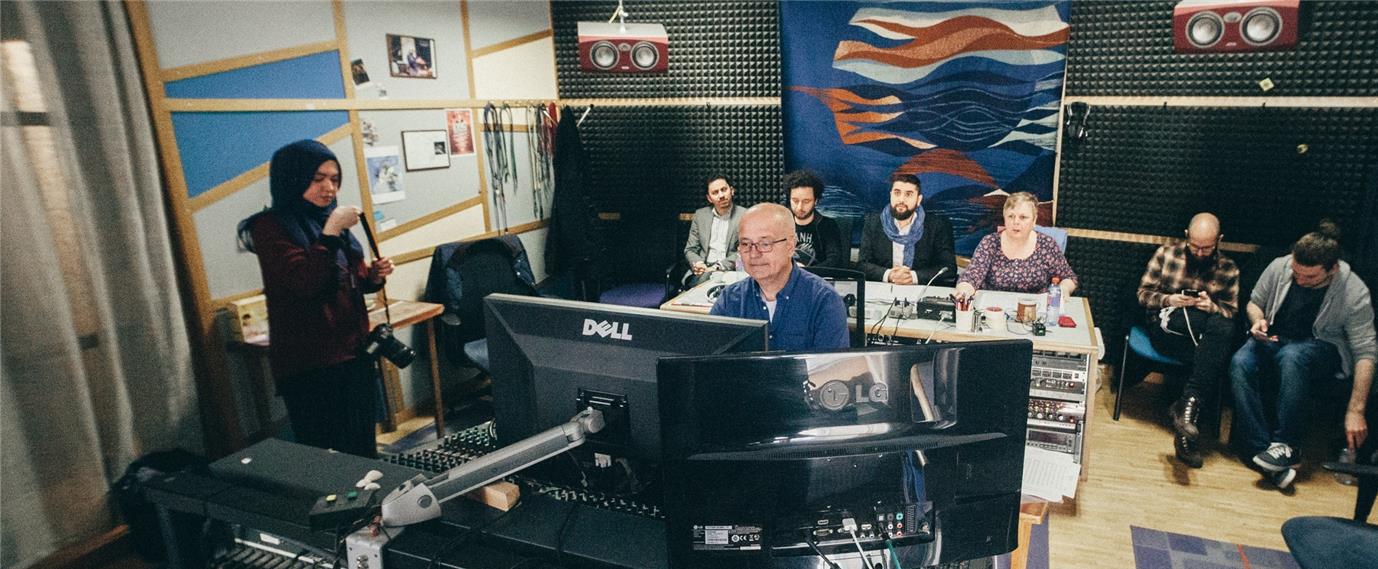تمرُّ الموسيقى خفيفةً في الفيلم الوثائقي، مكررة، وبسيطة، تكادُ لا تشعرُ بها أحياناً. وإن أحسست بها، فهي لا تعكسُ دائماً هوية العمل، وقد تكون – غالباً – مقطوعةً مشتركةً لبرنامجِ يعرض سلسلة وثائقية متنوعة، الأمر الذي يعكسُ عدم توافقٍ بين موضوعات السلسلة والمقطوعة.
تَطور الفيلم الوثائقي في شكلهِ ومضمونهِ وتعددت أساليبهِ وأصبحَ دارجاً وجود خيط درامي في الإنتاج، بيدَ أن الموسيقى لا تزال معزولةً عن التوظيف، كأنها فاقدة للشرعيةٍ في هذا السياق، رغمَ أنها، تاريخيًّا كانت الصوت الأول المصاحب للصورة في بدايات صناعة الأفلام الصامتة، والتي كانت وثائقية، إذ ساهمت آنذاك في كسر جمود ورتابة العرض، وهذه المهمة للموسيقى التصويرية لم تنته مع ظهور الصوت في الفيلم، بل زادت أهميتها وبدأت كجزء أساسي فيه.
بين الشرق والغرب
تحتفظ الذاكرة بعدة أفلام وثائقية عالمية استخدمت الموسيقى فيها كجزء مكون من هوية العمل، كما في فيلم "البركة" للمخرج الأميركي رون فريك، والذي أنتج العام 1992، والسلسلة الوثائقية "كوكب الأرض"، إنتاج 2006 للمنتج البريطاني ألاستيير فوثرغل، وفيلم "بيتنا" الذي أخرجه الأميركي يان آرثس برتراند عام 2009.
عربيا لم تحظَ الموسيقى التصويرية بالاهتمام المطلوب في الفيلم الوثائقي، إذ يُرجع المخرج والمنتج إيهاب خمايسة السبب إلى "انخفاض ميزانيات الإنتاج"، كما أنها تمثل "آخرأولويات الإنفاق لدى المنتج"، مقدراً حجم مخصصاتها في حال وجودها بين "5-7% بأحسن تقدير"، مقابل موازنات الأفلام الغربية التي تصل ما بين 15 – 25%.
المخرج والمنتج محمد الصعيدي يترجم تلك النسب في بريطانيا في الحضور الجماهيري للموسيقى، موضحاً "أجد الموسيقى التصويرية حاضرة بقوة في الفيلم، إذ يترك لها الوقت لتتنفس وتعبر عما يريده المخرج أو المنتج، و"لتحفز المشاهد من أجل المتابعة كلما ابتعد عن الفيلم".

الوثائقي والواقعية
وفي المقابل، تذهب بعض وجهات النظر إلى أن استخدام الموسيقى يجب أن يكون في حدود ضيقة "باعتبار أن الواقع في الفيلم الوثائقي لا يحتاج إلى ما يُحفز المشاهد عاطفيا أو يضعه في أجواء معنية، ولكن لا يمكن القول إن هذه قاعدة أساسية في الفيلم الوثائقي" كما يرى المخرج والمنتج بشار حمدان، الذي يعتقد أن الأمر "يعود في النهاية إلى الرؤية الفنية للمخرج وتقديره لاستخدام الموسيقى من عدمها، ولكن بشرط عدم المبالغة والتهويل، فهي ليست الحل الوحيد والأفضل لنقل المشاعر والأحاسيس".
ويستشهد حمدان بفيلم "وُلد في غزة للمخرج هرنان زين، إذ كانت الموسيقى قيمة إضافية في الفيلم برأيي، فلا يمكنك وأنت تُشاهد الفيلم أن تتجاهل روعة الموسيقى وطريقة توظيفها الذكية، فهي تأسرك مع الفيلم بتفاصيله، وفي مشهد النهاية تشعر بأن البحر والموسيقى والطفولة اجتمعوا ليحكوا لنا عن غزة".

وعلى الضفة الأخرى، يستشهدُ برأي المخرج الكمبودي الفرنسي ريثي بان بأن"استخدام الموسيقى في الأفلام الوثائقية خاص للغاية، لأنه يمثل الواقع"، أما المخرج الإيراني أصغر فرهادي فهو لا يستخدم الموسيقى "لأنه يريد لمشهده أن يكون أكثر واقعية ولا يريد للموسيقى أن تأخذ المُتفرج إلى عالم الأحاسيس والمشاعر".
وحول هذه المسألة، يرى خمايسة، أن خيار الاستخدام من عدمه "جزء من معالجة الفيلم ولكن بكل الأحوال يجب أن يكون هذا الخيار مصمم بما يخدم الفيلم وليس خيارا اعتباطيا أو ماليا"، مؤكدا أن وجهة نظر المخرج "تتحقق في اختيار اللقطات وحجمها وزوايا التصوير وترتيب السيناريو والمونتاج والصوت بما يتضمنه من اختيار الموسيقى المناسبة والاستخدام الذكي والمتقن لها بحيث لا تطغى على المشهد وأن تكون بنفس توجه الفيلم"، مشيراً إلى أن هذه الموسيقى التصويرية يجب ألا تكون مقطوعات منفصلة بل هي "روح متسلسلة تصمم وتعزف للفيلم غالبا بعد الانتهاء من عملية مونتاجه".
الجمهور والموسيقى
لا يتشدد الصعيدي في حضور الموسيقى التصويرية في الفيلم الوثائقي، بيد أنه يستدركُ قائلاً: "إلا كشرط لاكتمال عناصره، ولتعبيره عن موضوعه بالشكل الأفضل؛ فالموسيقى هي عنصر فني يقدِّر المخرج الحاجة له وطريقة توظيفه تماما كما يفعل مع باقي العناصر الفنية والجمالية في الفيلم، مثل طريقة التصوير التي يعتمدها في فيلمه، أو اللون الذي يفضله لصورته".
ويتابع الصعيدي قائلا "عندما أنتج أعمالا وثائقية للتلفزيون فإن جمهوره ليس من النقاد، بل من الباحثين عن الإمتاع والتسلية والأعمال البصرية الجاذبة، فهم ممن يجهدوك بالتفكير في الطريقة التي يمكن أن تُبقي عينهم وذهنهم متيقظا مع الفيلم دون شرود، وهنا أجد نفسي كمخرج أمام الحاجة لتوظيف الممكن من العناصر الفنية في عملي التي تجعله ليس أكثر وضوحا وحسب، بل أكثر جاذبية وإمتاعا وتشويقا، فتأتي الموسيقى كعنصر مهم لتحقيق ذلك".
ومع ذلك، يقُّرُ الصعيدي بوجود ضعف عربي بالموسيقى التصويرية، ويتجلى ذلك في أمرين رئيسيين من وجهةِ نظرهِ.. "أولهما غيابها عن سياق الفيلم بشكل منتظم رغم أنها لغة تستطيع من خلالها أن توصل الفكرة والحس وتساعد المشاهد في ترتيب أفكاره وبالتالي إحاطته بالقصة والاستمتاع بها.. وأما مظهر الضعف الثاني، فهو مقدار ما يخصص للموسيقى في موازنة الأعمال الوثائقية العربية، فهي بالعموم مبالغ متواضعة تضع المخرجين المهتمين في الموسيقى التصويرية أمام خيارات محدودة".
دور الموسيقى في الوثائقي
الموسيقار نجاتي الصلح يذكر أن التطور الذي شهده قطاع الإنتاج الوثائقي في العالم، والوطن العربي في السنوات العشر الأخيرة، دفع للارتقاء بمستوى جميع أدوات الإنتاج الوثائقي كالمونتاج، المؤثرات الصوتية، كتابة السيناريو، والموسيقى التصويرية، موضحاً أن الأعمال الدرامية خصصت في العقدين الأخيرين، ميزانيات ضخمة للموسيقى وتنفيذها، وذلك لإسهامها بشكل كبير في إخراج العمل، إضافة إلى استخدامها كمُنت?ج يتم تسويقه بعد الانتهاء من عرض العمل.
ويقرُّ الصلح أن ميزانيات الوثائقي لا تزال ضئيلة نسبياً، "لأن شريحة متابعي الوثائقي أقل بكثير من متابعي الدراما"، الأمر الذي يدفع المنتج أو المنتج المنفذ لـ"تخصيص معظم الميزانية لجمع المعلومات والصور وإخراج مستند (الفيلم الوثائقي) بقيمة عالية من المصداقية في التوثيق مقابل إهمال بعض العوامل الكمالية (كما يعتبر البعض) كالموسيقى التصويرية".
ويتطرق الصلح إلى تجربته إذ قام بتأليف الموسيقى التصويرية للأعمال الدرامية والوثائقية على مدار 15 عاماً، وقد "أحدثت تطوراً ملموساً في الشكل النهائي وتقبل المشاهد للفيلم الوثائقي، إذ يتم الاجتماع بمخرج العمل، ومناقشته بالدور الذي يرغب أن تضيفه الموسيقى للأحداث على اعتبار أنها شخصية خفية تقوم بربط الأحداث بعضها ببعض، أو أن تقوم بتعزيز المشاعر المصاحبة لبعض المشاهد، أو أن تبقى في الخلفية المرافقة بالمشهد كعامل محايد يقوم فقط بكسر رتابة السرد الوثائقي".
ويشدد الصلح على أن من أهم عوامل نجاح الوثائقي في وقتنا الحالي "تأليف موسيقى خاصة بالفيلم، إذ يتم تأليفها بشكل مناسب للصورة والأحداث والمكان، على عكس استخدام المكتبات الموسيقية المؤلفة موسيقاً سواء المجانية، أو المدفوعة منها، علماً بأنها تفتقر بشكل عام للموسيقى ذات الطابع الشرقي والإثني، و تعتمد على طابع عام (General Theme) ليساعد المخرجين على استخدامه لتعبئة المساحات الفارغة من أفلامهم.
الفيلم الوثائقي "لا يخرج عن كونهِ عملا إبداعيا أسوة بأعمال الدراما والسينما"، بحسب الموسيقار أمين بوحافة، الذي يشدد أن هذا العمل يتعدى أحياناً "الأجناس الأخرى في الإبداع فيكونُ في الريادةِ، لاسيما وأنهُ يمثل تعبيراً عن الواقع ورصدا له، الأمر الذي يجعل أي إضافة إليه تمثلُ إثراء وتنوعا"، وهنا يتساءل: "ألا تتضمن الأفلام الوثائقية والبرامج التلفزيونية موسيقى عادةً ما يتم اختيارها من المجموعات المجانية، أو المدفوعة؟".
وفي إجابته على ذلك، يشير بوحافة إلى ضرورة التفريق "بين العام المجاني أو المدفوع المشترك، والذي في هذه الحالة يعني تكرار ما هو متاح، وبين تأليف مقطوعة تتمازج وتتناغم فيها الموسيقى مع هوية العمل التلفزيوني"، مشيراً إلى أنه رصد هذا الأمر في عملهِ الموسيقي الحالي لمشروع السلسلة الوثائقية "مغتربون" – تبث على قناة الجزيرة- إذ ألَّف ولحن 18 مقطوعة موسيقية من عزف أوركسترا براغ العالمية "في عملٍ إبداعي يتجانس مع السلسلة الوثائقية في الموسم الجديد الذي سيعرض على شاشة القناة".
ويختم حديثه قائلا: "الموسيقى التصويرية ليست نشازاً، ولا عنصراً غريبا عن الفيلم الوثائقي، والبرامج التلفزيونية، مع الأخذ بعين الاعتبار، أن هنالك من يرفض توظيف هذه الموسيقى، في عملهِ، خشية تحميل الفيلم شحنات عاطفية من التأثير، والذهاب إلى مساحة مشتركة مع الدراما، لكن في نهاية الأمر.. الموسيقى لن تتمكن من تغيير الواقع في الفيلم الوثائقي، ربما تشكل عنصرا جديدا دراميا، يسجل للعمل، ولا يحسب ضده".








































